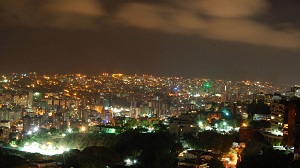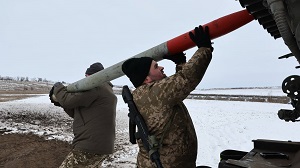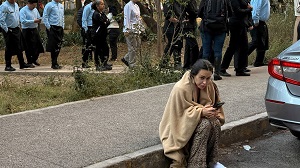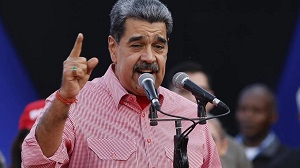US Treasury to sanction Hezbollah-linked Lebanese individuals, groups

Alarabiya
The United States is set to list three people and 12 entities in Lebanon who are linked with the Hezbollah Martyrs Foundation on its terror sanctions lists, according to Treasury Department officials.
The new sanctions reinforce the hardline the US is taking on Hezbollah in Lebanon.
Previous US policies have prioritized the stability of Lebanon, but the new rules of engagement take a hardline on Iranian-backed Hezbollah as part of the American “maximum pressure” campaign on Iran.
"The Trump Administration and its allies in congress from both parties are determined to continue their.policies of maximum pressures on the Iran regime and their allies in the region to obtain a major shift in behavior," Dr. Walid Phares, a former foreign policy adviser to then-presidential candidate Donald Trump in 2016, told Al Arabiya English.
The last round of US sanctions to be slapped on Lebanese Hezbollah were in August 2019 on Jammal Trust Bank (JTB) for facilitating the financial activities of Hezbollah.
“The second [bank we sanctioned] was JTB after Lebanon was already downgraded,” said a senior US State Department official to Al Arabiya, in referring to Lebanon’s credit rankings falling throughout the first half of 2019.
“We had worked with that bank for more than a year to get them to do the right thing, and they didn’t take it seriously,” the official said. “They brought it upon themselves.”
Sanctions on JTB were announced August 29, and by September 19, the bank had announced it would liquidate current accounts and close shop in coordination with the Lebanese central bank. JTB denied US allegations it funded Hezbollah.
Ryan Bohl, a Middle East analyst at the Texas-based foreign policy analysis firm Stratfor, told Al Arabiya English the latest round of sanctions are a high-risk gamble for the US.
“It could cause damage to Lebanon’s economy depending on the scope and scale of sanctions and, the US could endure blowback from all of Lebanon’s political factions,” Bohl told Al Arabiya English.
“If the [Prime Minister Hassan] Diab government weakens or collapses, and no pro-US government emerges out of that, US sanctions become seen as the reason for Lebanon’s economic problems,” he added.
Alternatively, most Lebanese know the country’s economic problems are the product of a corrupt ruling class, Bohl said.
“The US has an opportunity here to exploit that sentiment, to layer on sanctions that make it more difficult for Hezbollah to do business, carry out operations in Syria, meet their payroll, and all the other benefits that make them such a powerful social force in Lebanon,” Bohl said. “It’s an opportunity for Americans, but it’s a narrow line they’re walking.”
The senior State Department official could not comment if anyone in Lebanon’s new Hezbollah-backed government may be on the list of names, when he spoke to Al Arabiya earlier in February.
Following months of protests and ongoing financial and economic crises, the new government headed by Diab was formed mid-January after former Prime Minister Saad al-Hariri stepped down in late October.
“What I’d be watching for is scope and scale of sanctions if do they go through. Do they decide to target entities linked to Hezbollah,” Bohl said. “Do Amal [the other predominantly Shia political party] start to see a larger sanctions regime placed on them? Does the Lebanese state itself become a target of US sanctions because it’s under control of a Hezbollah-linked government without an opposition factor.?”
History of sanctions
Years prior, in 2011, the first Lebanese bank to be targeted by US sanctions was Lebanese Canadian Bank Sal as a financial institution of primary money laundering concern for “the bank’s role in facilitating the money laundering activities of an international narcotics trafficking and money laundering network.” The bank shut its doors shortly after.
In February 2018, the US Treasury targeted business operations of Hezbollah and designated six individuals and seven entities across Lebanon, Iraq, Sierra Leone, Ghana, and Liberia.
In July 2019, The Trump administration imposed sanctions on three senior Hezbollah officials in Lebanon, the first set to directly target members of Lebanon’s Parliament. Members of Parliament Amin Sherri and Muhammad Hasan Ra’d and senior Hezbollah security official Wafiq Safa were sanctioned by the US Treasury Department.
Hezbollah hurting
When the US withdrew from the 2015 Iran nuclear deal in 2018, sanctions were re-imposed on Iran, and the US warned other countries not to do business with Tehran. The US government views Hezbollah’s military and political wings as a singular entity and the imposition of sanctions was meant as a stark warning to Lebanese Hezbollah, and the region, about the consequences for working with Iran.
Hezbollah reportedly has been hit hard by US sanctions on Iran. In spring 2019, Hezbollah members reported receiving reduced salaries considering their funding from Iran, currently suffering its own economic hardships, diminished significantly.
Hezbollah Secretary-General Hassan Nasrallah acknowledged difficulties created by American sanctions in March last year.
David Daoud, a research analyst at United Against Nuclear Iran (UANI) told Al Arabiya English that while Hezbollah may have been hit by US sanctions, the group has five annual charity drives, and their revenue is derived from legitimate businesses in Lebanon and abroad, as well as through illicit means domestically and outside Lebanon.
The US understanding of how drastically Hezbollah had been impacted by sanctions on Iran may be exaggerated, Daoud said.




